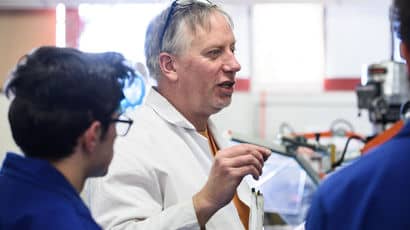Public trust in drinking water safety is low globally, study finds

A new study has found more than half of adults surveyed worldwide expect to be seriously harmed by their water within the next two years.
Co-authored by UWE Bristol’s Professor Chad Staddon alongside global health experts at Northwestern University in Illinois, the University of North Carolina at Chapel Hill and the University of Southern California, the study sought to understand public perceptions of drinking water safety.
Because perceptions shape attitudes and behaviors, distrust in water quality has a negative impact on people’s health, nutrition, psychological and economic well-being — even when the water meets safety standards.
“We are accustomed to hearing that citizens of developing nations don't trust their water sources but our analysis of this new global data set shows that citizens of developed countries are worried about their water too,” said Professor Staddon.
“Our analysis shows that citizens in even highly developed countries such as Sweden worry about water related harms and this worry seems to be linked to declining trust in water management and public health protection institutions.”
Staddon, Professor of Resource Economics and Policy at UWE Bristol, contributed to the design of the study, data analysis and interpretation, and writing of the manuscript.
Using nationally representative data from 148,585 adults in 141 countries from the 2019 Lloyd’s Register Foundation World Risk Poll, the authors found a high prevalence of anticipated harm from water supply, with the highest in Zambia, the lowest in Singapore and an overall mean average of 52.3 per cent.
They also identified key characteristics of those who thought they would be harmed by their drinking water. Women, city dwellers, individuals with more education, and those struggling on their current income were more likely to anticipate being harmed by their drinking water.
The researchers found that, surprisingly, higher corruption perception index scores were the strongest predictor of anticipated harm from drinking water, more so than factors such as infrastructure and Gross Domestic Product.
Further, even within countries with consistent access to basic drinking water services, doubts about the safety of water were widespread. For example, although less than 10 per cent of UK respondents said that they had experienced harm from drinking water, more than 20 per cent worry that they may in the near future experience such harm.
The researchers noted that it is difficult for consumers to judge the hazards and safety of their water supply because many contaminants are invisible, odourless and tasteless. Without adequate information, many are left to evaluate the safety of their water based on prior experiences, media reports, and personal values and beliefs.
The co-authors suggested actions officials can take to improve public trust around drinking water, including efforts to make testing more readily available, translate test results, replace lead pipes and provide at-home water filters when contaminants are detected, as well as providing improved access to safe drinking water.
The study Self-reported anticipated harm from drinking water across 141 countries has been published in the journal Nature Communications.
Related news

10 February 2026
Work by UWE Bristol lecturer features in Government’s National Cancer Plan
Work by a UWE Bristol academic has been included in the Government’s National Cancer Plan.

23 January 2026
On-demand minibus services beneficial in rural areas but face financial challenges, trials suggest
Trials of ‘demand responsive transport’ minibus services boosted connectivity for people in rural and suburban areas, according to a new report produced by UWE Bristol researchers.

18 December 2025
UWE Bristol professor appointed National Institute for Health and Care Excellence CEO
Jonathan Benger CBE, Professor of Emergency Care at UWE Bristol, has been appointed as the new chief executive officer of the National Institute for Health and Care Excellence (NICE).

17 December 2025
Findings revealed from first UK study into experiences of mothers who are survivors of rape pregnancy
UWE Bristol academics have revealed the findings of the first UK-based study of the experiences of mothers who are survivors of rape pregnancy.

11 December 2025
Social media influencer work is far more demanding than it looks, research finds
A study exploring the mental health impacts of social media influencer work has revealed that life online is far more demanding than it appears.

25 November 2025
UWE Bristol experts join film Q&A exploring music and melodrama
Academics will take part in the Cary Comes Home Festival, with a post-screening Q&A exploring music, melodrama and emotional storytelling in classic cinema.

17 November 2025
Urgent reform needed to support ambulance-delivered end of life care, study finds
More than three quarters (78 per cent) of paramedics sometimes fear doing the wrong thing when caring for people in the last year of life, new research has found.

13 November 2025
Bristol’s screen industry experiences “boom-and-bust cycle” after post-pandemic recovery, new research from UWE Bristol finds
New research from UWE Bristol provides detailed insight into Bristol's screen sector.

13 November 2025
New AI research to revolutionise animal welfare
A UWE Bristol research project will combine behavioural science and AI to create technology that understands not only what animals do, but how they feel.

10 November 2025
Lessons from Low Traffic Neighbourhoods will drive better public engagement, study finds
Lessons from Low Traffic Neighbourhoods have informed a new toolkit to improve engagement with the public on challenging local street issues.

06 November 2025
First-of-its-kind study aims to help more people spend their final days at home
A new study will explore how architectural design could support end-of-life care in domestic settings.

29 October 2025
UWE Bristol academic unveils breakthrough in energy-efficient AI at NATO science forum
Dr Jonathan Lancelot has developed a new form of AI that could transform how intelligent machines operate in space, defence, and remote environments.
You may also be interested in

Media enquiries
Enquiries related to news releases and press and contacts for the media team.

Find an expert
Media contacts are invited to check out the vast range of subjects where UWE Bristol can offer up expert commentary.

We're creating tomorrow, today. RISE
Collaborating with industry, public sector bodies and communities, we’re redefining horizons and challenging conventions to impact lives positively.






